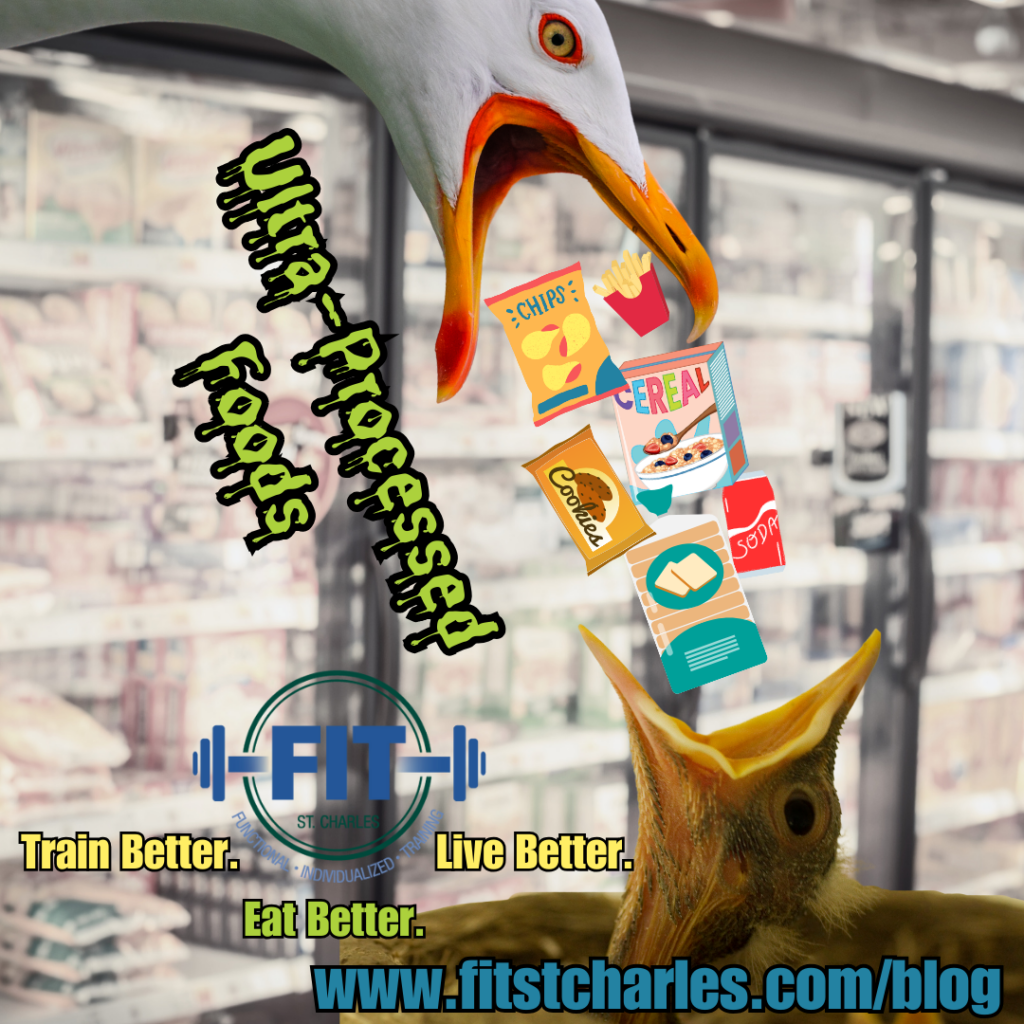
Is half of your diet made of pre-digested foods? And yes, you read that right. Think of it like this- you are a baby bird, and your mother is graciously regurgitating food for you to eat. Doesn’t sound appealing, does it? Well, that’s what ultra-processed food is, and as you might imagine, it’s not good for your body. When companies manufacture ultra-processed foods, they break down ingredients on a molecular level called “slurries” and then add emulsifiers that act like glue to bond that slurry with other added ingredients like food dye, sugar, and flavorings. Then, they can be shaped into whatever food manufacturers would like, and then they make it taste delicious.
Your digestive system usually breaks down food for you, but since this “food” has already been broken down into its most basic parts, it doesn’t move through the digestive system as nature intended. You don’t get full as fast and end up eating more, and because ultra-processed food is higher in calories from fat, sugar, and refined carbs, you end up gaining weight along with other adverse health effects. But it tastes good, and it leaves your body craving more.
Dr. Chris van Tulleken, an associate professor at University College London, calls it “an illusion of food,” and it’s everywhere. They hide in foods all over the grocery stores, fast food, and restaurants. For example, highly refined bread, sugary drinks, cereal, packaged sweets, and other snacks are all big offenders in grocery stores. In fact, Americans consume more than half of their daily calorie intake from ultra-processed foods, and many don’t even know it. The British Medical Journal analyzed dozens of studies with a combined 9 million participants and found consistent evidence that consuming ultra-processed foods has many adverse health effects, some of which might surprise you!
Unfortunately, evidence is mounting that consumption of ultra-processed foods leads to a higher risk of obesity, metabolic syndrome, and certain cancers. Ultra-processed foods usually contain higher amounts of sugar, salt, fat, and calories and are lower in fiber, vitamins, and protein. This means that you eat more to feel full, and you feel full for much less time than if you were eating whole foods, which usually leads to weight gain. Obesity in itself increases your risk for a myriad of health problems, including a higher risk of cancer. Increased weight is also a risk factor for metabolic syndrome and diabetes, and on top of that, people who eat a diet high in ultra-processed foods are 3x as likely to develop colorectal cancer.
While we might expect consuming high amounts of “predigested” foods to affect us physically, it’s not as obvious what effects they have on our brains- too often, we forget that what we eat impacts our mental health. Over-consumption of these types of foods leads to higher rates of anxiety and depression. Although studies surrounding this are still in the peer-review process, we know how we feel physically influences how we feel mentally. We know, for instance, that individuals who eat healthier diets have fewer depression symptoms. We also have a growing body of evidence that suggests that healthier diets reduce anxiety. We also know that diets high in ultra-processed foods are unhealthy, so it’s easy to put two and two together here.
The correlation between increased risk for depressive symptoms and diets higher in ultra-processed foods equates to a 20-50% increase in symptoms in people who consume a “predigested” diet. The risk increases as the amount of ultra-processed food in your diet increases. We aren’t sure exactly how much is too much, but your best bet is to cut out as much as you can. The correlation between mental health and diet is undoubtedly there, and experts believe that soon, we will have more concrete evidence proving causation between ultra-processed foods and depression and anxiety.
You might wonder how you can tell if what you buy falls into the “predigested” category. A few signs are easy to spot if you read the labels. Ask yourself- do I use this ingredient at home? Additives such as high-fructose corn syrup, hydrogenated oil, hydrolysed protein, flavor enhancers, emulsifiers, anticaking agents, and thickeners are things you wouldn’t necessarily opt to cook with, and it’s best not to eat them. Instead, The Dietary Guidelines for Americans recommends that we skip ultra-processed foods and opt for the good ole stand-bys- fruits, veggies, whole grains (pay attention to “refined whole grains” (they aren’t the same!), and lean protiens.
The FDA plans to change how manufacturers are allowed to label foods to make it easier to spot the biggest offenders. In the meantime, all we can do is be aware of what we put in our bodies. Let your body do the digesting for you, and skip all of those ultra-processed foods. You’ll feel better physically and mentally, you won’t increase your risk of certain cancers, and you might even slim down your waistline!
Still curious?
https://www.cnn.com/2024/02/01/health/predigested-food-wellness/index.html
